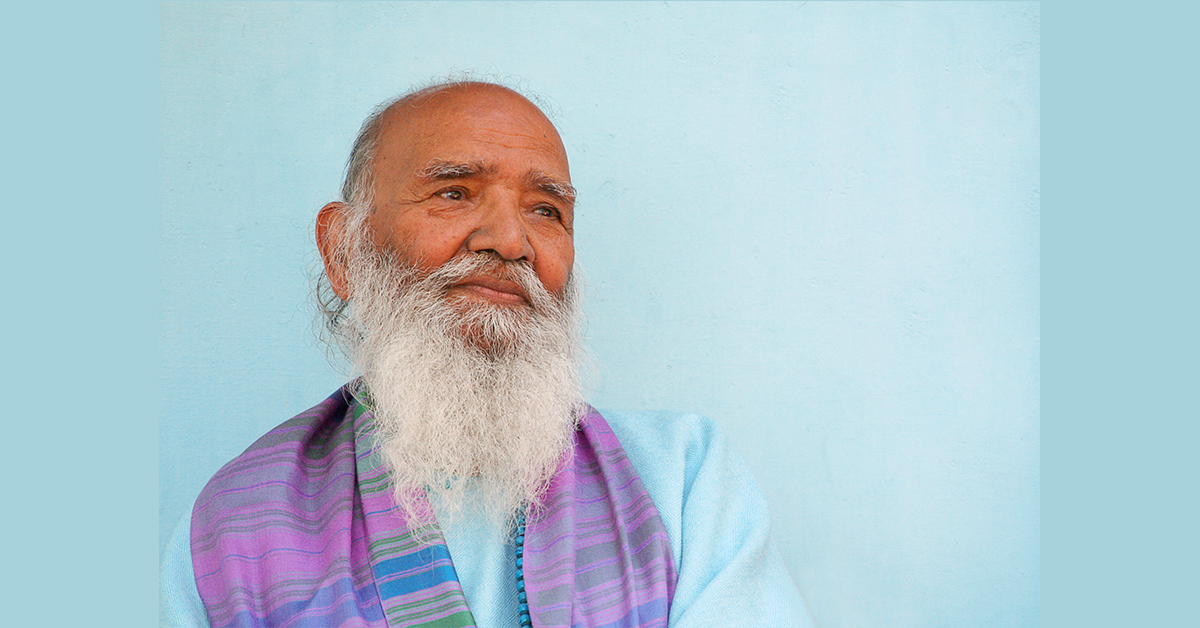Swamiji: We look like forms, but when forms were not there, what was there? When Nandi was not there, what was she? And now that she is, what is she, Shaardaji?
Shaarda: Space [Self, Oneness].
Swamiji: Then what was she at that time?
Shaarda: Space.
Swamiji: And what is your blanket?
Shaarda: The blanket is made of Space.
Swamiji: What is the Space made of?
Shaarda: Awareness.
Swamiji: Where is this Awareness?
Shaarda: It is everywhere, all-permeating.
Swamiji: But who is speaking about this Awareness?
Shaarda: Awareness in the form of Shaarda.
Swamiji: So Shaarda is a form?
Shaarda: Yes.
Swamiji: Why did you not now continue with Space—when you said that Nandi is Space, that was Space, this is Space, the blanket is made out of something that is from the Space—then why is Shaarda not the Space? [Laughter]
Shaarda: Because my intellect needs to develop further.
Swamiji: This is what human beings do. And you [Henry] are not human, you are divine. But your mother will say, “You, Henry,” your auntie will say, “You, Henry.” So now, who is “you”? When Nandi was not, she says that was Space. When twenty years before you were not, what were you?
Henry: Space.
Swamiji: When twenty years before you were Space, then why after fourteen years [his age] are you now not that Space? But we have been brought up in the company of those people who call themselves forms, and we have seen that the form of a seed changes into a sprout, the sprout changes into a tree, the tree changes into fruit, and the tree gets rooted out completely. So forms are changing. Therefore, Nandi’s consciousness, or Nandi’s mind, which at one time was Space, must be knowing Space, that “I am the Space.” But now the Space says, “I am Nandi, a form.” The sprout says, “I am a sprout at this time, and a would-be branch.” So a human being does not include Space, does not know Space, does not even have remembrance of the Space, other than form. Even if he talks about the Space, he makes a form of it—like Shaarda-formless was Space, Nandi-formless was Space—which means that you know the Space in relation to form. But what would be in relation to the Space?
Shaarda: Space.
Swamiji: If that would be the Space, then what improvement did you, as a human being, make that in relation to Space would be Space? You forgot one thing—I am not chiding or belittling you—but you forgot that Space and you call this the Space [indicating the space in front of him], and this space does not know you. Nandi knows you. Therefore, is she not greater now than the Space? Aatma Shakti also says, “the Space,” and Nandi thinks, “How shall I understand the Space? Henry also thinks, “How should I understand the Space?” Everybody says, “Space. I am Space.” I can also say that the Space means formless, but that is not the meaning of the Space.
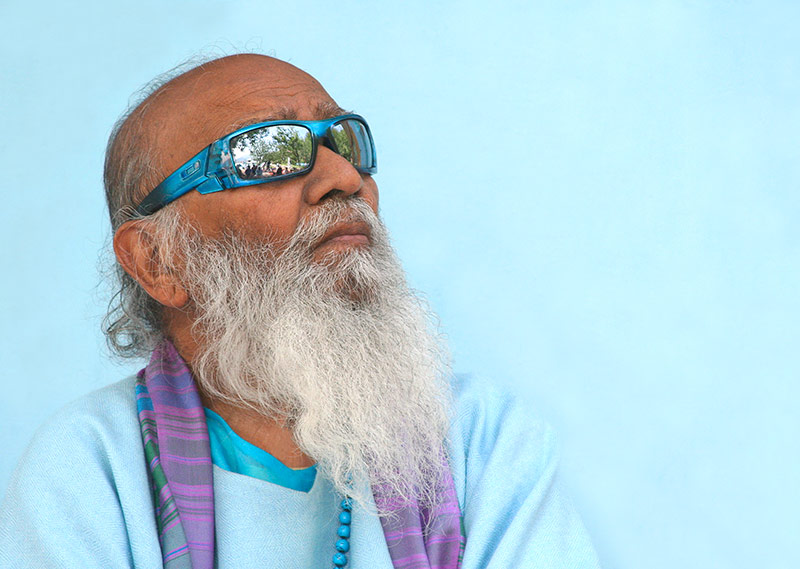
So Guru is the one who is not scriptures, who is not sentences or words, who is not Space—otherwise, he could not speak. You say, “Space, space.” Getting good answers for writing your thesis, you said Space, as if you get your PhD by saying, “Space. Everything is Space”—as if I am going to be convinced by that. We all see forms. Do we not see forms?
Shaarda: Yes.
Swamiji: We see them. Do we not see the Space? Yes. But we see forms and do not call forms as Space. Thus, our Space is mental—we understand that Space is formless, opposite to form. If we are formless, if we are the formless Space, then what is study for, what is marriage for, what are children for? So we have to analyse this. After having become fully educated and having participated in this Space, we must know the meaning of Space, as we know the meaning of forms. What is the meaning of form?
Shaarda: It is that which is known by the five senses and the mind.
Swamiji: If a man is standing beyond your house and I do not see him, what is he?
Shaarda: He is known by the mind.
Swamiji: So that which is known by the mind is form, because the eyes can see form. And when the eyes do not see forms, the mind wants to say that is Space, which you have said—you said that when Nandi was not there, then she was Space—because your attention is on form-Nandi, or form-anybody, and you call that as Space. Whereas that Space has nothing to do with a human being, because that Space does not study, it does not see an airplane. … Then who sees it? Form. If form sees, then if you say “Space,” you will not be able to see the airplane, you will not be able to see the flower vase, and you will not be able to see Henry, Nandi, or Aatma Shakti.
So you are not the Space, whereas all the time you say, “I am the Space.” If you say, “I am the Space,” why is it that you said “I am—the Space”? You think as if disease or un-health will not come to that Space, so you feel good thinking, “I am originally that Space. That Space does not die because it has no form, so I am undying Space.” This is a mistaken idea of Space.
But at least it is a better idea, insofar as the body is concerned, because you see the body as changing or dying, whereas space [physical space] does not see an end, or death. Birds die in the space, clouds die in the space, airplanes are also shot in the space, and many things get up in the space, like bubbles, and finish and die. As space does not die, so Space is a better idea with a human being, who is idea-full about form and formless. He began to call the Space as formless, and for form he says, “It is with form.” If he had first seen the Space and that form came out of the Space, then what would he have said?
Shaarda: Space.
Swamiji: Space. But now he does not call form as Space, he calls that as Space. This means there is confusion with a human being, that form is not Space. Yet he has heard of Shyam Space, and that Space feels very good, because there is no death for it. So the idea of death makes one’s mind to feel, to know, that Space-form is good, because it is a formless-form. But “I am the Space” is not knowledge, because how would you know, “I am the Space” if the Knower-Space were not there? Therefore, the Knower-Space is not empty space.
So prior to this space we know the Knower, and we do not see the Knower here in the space or there in the space. We know the Knower in the form of a human being, who, maybe according to you, like Nandi, is a form out of Space. But what is the difference between that Space and Nandi-Space or Henry-Space? Nandi has the Knower. So if she knows the Knower-Space, then she will always say that “I am the Space,” and then I and the Knower is one. Right? So then the Knower is where? Mary?
Mary: In Knowingness.
Swamiji: And Knowingness is where?
Mary: In Consciousness.
Swamiji: And Consciousness is where?
Mary: In a human being who has become realized.
Swamiji: If he becomes realized, and a person wants to become realized by having an idea of the Knower, then where is the Knower? You can say anything, and then I can make up [the answer].
Mary: Knower is in the Knower…in thought.
Swamiji: Knower is in thought. But what is that which is the Knower?
Mary: Awareness.
Swamiji: Now, she said Awareness. Then what is that which is the body?
Dinesh: Isn’t it that it is something we have to transform into, rather than trying to give it a label?
Swamiji: But we have to carry on with this, whether we transform or do not transform. Do we not exist?
Dinesh: Yes.
Swamiji: So if we exist and exist with teeth, then where are the teeth? In the mouth. So if we exist as a human being, then where is the Knower?
Dinesh: Inside of us.
Swamiji: Yes, according to that you can figure out that it is inside of us. If the Knower is inside of me, and Shaarda said before that Nandi came as a form, she was Space, so according to our human mind that Space was outside of you, outside of Nandi.
We are fully alert, and I am having great respect for your intelligence. But I am trying to bring into your awareness a bhoomika, a standard, which is not there. Such as in the evening, for a child there is a thief seen in a stump. Now how to approach this child except to say, “The thief is not, the thief is not, the thief is not!”? But he is seeing a thief, and he is afraid. If that fear is there, then the fear is due to what? Why should it not be said that, “Fear is in me”? What is wrong if Nandi said, “Fear is in me”? She can use that fear, or whatever, if she wants to get rid of the fear. But fear is in me. And fear is not a substance, fear is not a dough, or earth, or a tree. Then what is fear?
Shaarda: Fear is a consciousness.
Swamiji: Then fear is a consciousness. And where is consciousness?
Shaarda: In a human being.
Swamiji: In a human being. So how did consciousness come in a human being, when a human being is matter?
Shaarda: In order to be able to function as matter, you need consciousness, intelligence.
Swamiji: You are saying that consciousness is separate from a human being?
Shaarda: It is the essence of a human being.
Swamiji: If it is the essence of a human being, then who now knows the essence?
Shaarda: The Knower.
Swamiji: The Knower. And where is the Knower?
Shaarda: In me.
Swamiji: In a human being. So in a human being, there is me. Right? Then check—I am going to pose a question here. You are very, very alert. This is what our subject matter is. I am understanding it, grasping it, but I want to ask you further: You have seen a sesame seed and you have seen oil. The sesame seed has oil—oil is in the sesame seed. Is the sesame seed in oil?
Shaarda: … [Pause] Yes.
Swamiji: Where?
Shaarda: They are not separate, they are the same essence and one.
Swamiji: Then why is the sesame seed seen as separate and oil is not seen?
Shaarda: Because the human faculty of vision doesn’t have the ability to see it, but the understanding has the ability to understand it.
Swamiji: So understanding must belong to a human being?
Shaarda: Yes.
Swamiji: Then why will he not understand that the sesame seed is independent of oil?
Shaarda: Yes, he can understand that also.
Swamiji: So then if the sesame seed is oil, then where is the sesame seed? Is it in the oil?
Shaarda: There I will say no.
Swamiji: You have to say no! You understand. Now this is evolution over and above what you were saying, that the sesame seed and oil is one and the same, which means that both are just the same. Right? And who is speaking this? A human being. A human being is speaking from what? From the mind. So for the mind, there is the sesame seed and oil—that is the mind. But there is someone for whom when the sesame seed is burnt there is neither oil nor the sesame seed. Who is that? That is the Self-Knower. So if she is the Space, that is the Self-Knower, and the Self-Knower never dies. But the Self-Knower is not in the sesame seed or in the oil. Therefore, Me-Self is equal to Me and is not in the body. And you were saying that Me is in the body, that the Knower is in me. This is the trouble.
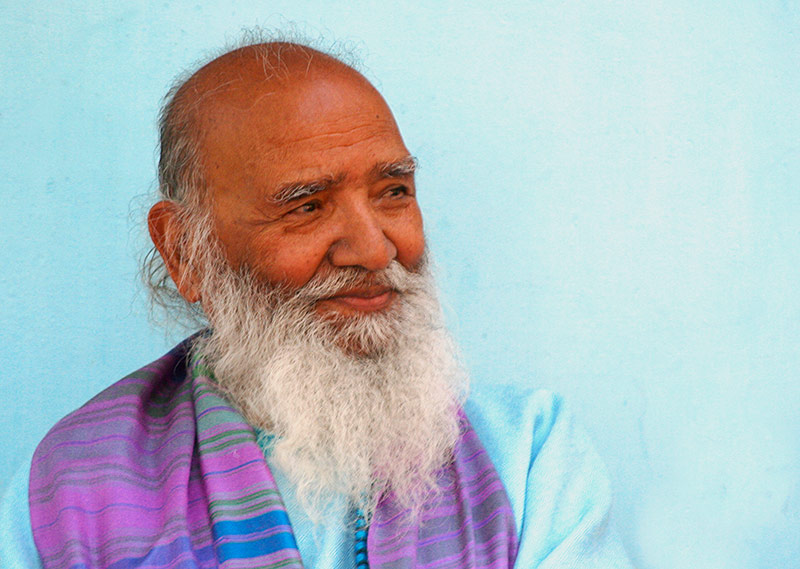
I am not saying less or more, but a human being needs to be evolved, needs to evolve to that extent that a standard of knowledge should come in him that he should not see the thief in the stump, he should not see the snake in the rope, and he should not see the rope in the snake. [Laughter] Is the rope in the snake? No. So then who is speaking for both the sides? The mind sees that the sesame seed and oil have a relation. Relationship is created by the human mind, and freedom is created by the Guru—that there is no sesame seed in the oil. You have never seen a sesame seed in oil: you drink it, or you use it, or you smear it, but there is no seed in it. So the sesame seed is not in the oil. In the sesame seed, there is oil, right? In the Self, there is the body. But in oil there is no sesame seed, in the body there is no Self. And the mind makes it: God and the world are one, you and I are one, this and that is one. You have understood it?
Shaarda: Yes, yes.
Swamiji: I leave it over here, because if you say, you will not be able to say it. You understood it?
Shaarda: Yes.
Swamiji: So you understood it, and you understood that the Self is not in the body or in the world. Because people think that the body and the world are, whereas the body and the world cannot be without the Self, therefore the Self alone is the reality. But due to not being aware of this fact, man, with his mental awareness, knows that the body and the world are separate and thus that the Self must be separate somewhere. Then what is Dikpal going to conclude?
Dikpal: It is nowhere that you can think of.
Swamiji: But why would you not be able to think of the Knower, when it is the Knower who says that the Self is nowhere that you can think of? So the Knower exists. Then the Self alone is, which means no sesame seed and no oil. But the unrealized man has to think of a thing which is the sesame seed, and he thinks that oil comes out of the sesame seed. That is why the person, or mind, ignorant of the Self has to think that there is the Self, because he sees the world, body, objects, and things, which he thinks should come out of the Self just as oil comes out of the sesame seed. That is why he is unable to transcend the functioning of the mind and, having been transcended, know the Self—knowing which it is then not necessary to say, “Now the mind knows the Self.” Why? When the mind has become the Self, why should it say, “I am the Self”? Then the Self alone is the oil, the Self alone is the body, the Self alone is the mind, the Self is the whole world. Then why is the Self in the body? That is what I say, that the Self is not in the world and the body, because if you again say that the Self is in the body, then it became two, and that is dwait.
The human mind is dwait—and all the time we are talking about Oneness. We call Oneness as Space. So if you say this is Space [indicating the space in front of him] and you call this Oneness, then you are still in duality. You meditate daily—somebody on Guru, somebody on Space, someone on That—but duality is not finished. Duality will be finished only when in a human body somebody sees this consciousness evolved that there is neither this world-body nor is there the Self: that is the Self! [Applause] That is Truth. There, we call it the Space, where the body is not and the Knower in the body is not. Otherwise you will say that the Knower is outside. If I say, “The Knower is not in the body, the sesame seed is not in the oil,” then you will immediately say, “Then it must be outside.” If the seed is outside, if the sesame seed is outside of oil, then where is it?
Why will you not be able to answer? Because the human tongue cannot reach there: that is the Self. As long as the human tongue reaches the Self as Space and form, you are in the same duality. So I told him that is your Space, and that Space—call it Nandi, call it you, call it me—is one without a second. It is not one nor a second: that is the meaning. But that is what a human being with mind thinks, that the Self must be God, or Brahm (Oneness), or Atma (Self), and that the world has come from the Self. That means that the world is in the Self. But if this is so, then where is the Self? Is the Self in the world? It is not there, because the Self alone is.
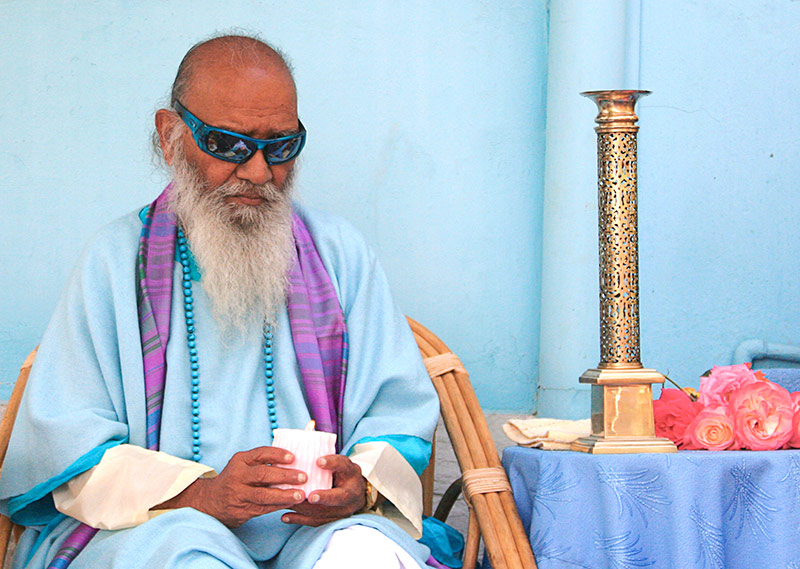
We are using words because you have read them, but all those scriptures could not bring about Adwait, or Oneness, and that is why you need a Guru. … In That, there is neither sesame seed, nor oil, nor Knower, nor body. But in order to reach you, at least one among you, I have to bring in something that may completely blow you, and That is what you are.
So either you say you are Space or you say you are the body. You say, “You, Swamiji, are there. Because I know, so you must be inside the body.” And if I say that the body dies but you don’t die, then you say it must be outside, whereas there is no you and there is no body. That from where both you and the body, as if, are made, imagined, or constructed artificially, That is real!
This is what we are knowing when I say that your pain and suffering should go away. Why should pain and suffering go away when you are the body? It will never go. Then you will say, “Suppose it doesn’t belong to the body, then it belongs to the mind. Then pain and suffering is in the mind.” Then adhi-vyadhi (mental and physical pain), and all kinds of things. You never get completely related to that where there is no relation. The human mind makes relations, and it makes them because of words, because of sentences, because of the senses, because of the body. So as long as we are using language, we are apt to commit mistakes. In what way will you reach there where language does not reach? Even here, with the sesame seed and oil, you come to know when you take the oil that the sesame seed is not in it. Then where is it? The tongue cannot describe it. The tongue, or language, cannot reach there. That is why the mind cannot reach there, because the mind only works for form and name, which are in language. Such a thing you have to know. …
Because of the human mind, doubt is created, and on the level of doubt we are waging war, we are bringing about peace, we are bringing about a solution. Now, I have told you that it is not there. The whole field is non-existence: there is neither the Self nor the body. But without the body of a human being—now I am saying the same thing but in other words—what I have just related or said to you and you realized could not be known. You realized because all this was led over there, when there was neither aught nor naught. That was there. There are no words that we can reach with. So that is the Space. …
You understood this fact after thirty-two years. But in our language, when you will speak, you will again see that you are saying the same thing, roundabout—either this, or that, or that. You will say, “Yes, yes. This is really very good. I thank you.” When I thank you, then I will say, “I send you, Roberta, with great joy and happiness. I wish you well over there in England, and do satsang.” Brijendra was here. He said she’s fond of satsang. What satsang is she fond of? She has done so much satsang, but what have satsangees given to her? Satsangees have given her either Space, or mind, or body, or relations, or duality—that is the satsang you do! Therefore, why should it not be the Self-realized state? Without the Self-realized state, there is no other way! Without the Self-realized state of the kind that I spoke to you, there will be no freedom from pain and suffering, age, old age, and death. So the aim is that. And you remain in a rigmarole, roundabout, roundabout, and do not reach there. Because if you reach there your mind is gone, and if the mind is gone then the man is gone, and then you will say, “I’m going to die,” because I is the mind and the mind is the I. Since it is so deep, I understand that those who are deep understood, and they will work on it and will see it. …
That Freedom is the Space. So we use the word “Space” against this body, or all bodies. But you never questioned it. You learned that Space is like—Dikpal has gone, so we can talk about it now—gold is [Laughter] and the ring is in the gold, right? On behalf of your neighbour, Dikpal?
Shaarda: OK. Yeah.
Swamiji: The ring is in the gold—that is what Dikpal says. So the ring and gold are both there. But he does not see that the ring is not there at all. Why should the ring be in gold? Why should the Self be in the body when the Self is not there? So this mind is like that, it is a kind of whirlpool. Now, it is a whirlpool and it’s whirling, but man does not see water, he sees a whirlpool. There is no whirlpool. There is no mind. But with the mind he sees the mind.
Thank you. It is not necessary that you got it. Whatever you got, fine. But from my side, I just want to let you know about that. By doing so, we are working on this mind about which you think, “I am this.” …
The tongue does not reach there, which I have said. It is our good luck that we have manipulated some words and examples and got something—which is only that which is no words, no language, no mind, and no senses; yet it is there, and I know that it is there. But I still say Osnat, Shaarda, Dikpal. More than that, I cannot say anything. Because when I see a form, the mind has to say it is a form and has to say a name; otherwise, there will be no talk. With those people who are maun (silent) you don’t hear, so maun does not communicate anything to you, because Maun (Absolute Silence) is like silence. So you make silence as the Space. [Laughter] …
You may not say, “The Self,” but that is it, because if you say the Self, then again it is the sesame seed. [Laughter] So you have understood that. When we say that you have understood, then again we say you— the mind, sense, everything, and all that, but when you have understood That, then That is. One has to work on it. When I have said this, then you will hear it again and again, see it on the video again and again, and try to unfold the standard of Gyan (Knowledge): not a baby standard, not a human standard, but that Gyan which has no name, and so we say it is Ateet, we say Beyond. …
Another name it goes by is Awareness. Why? You always associate Awareness with the mind, with chaytan (consciousness) and jar (matter). Jar is insentient and chaytan is the mind, man, or any person. That is the human movie—jar and chaytan, sat (existence) or asat (non-existence). How to get out of sat and asat was today. Somebody exhibited or saw it, but it is not enough. Because you will see it, but after some time, when you leave here or are with other things coming and something else happening, you will say something else. … If we say Shuddh, Pure, Free, Forever Awareness, this is just cramming. How to reach That, perhaps was this. But some of the persons, they will tell me the story. [Laughter] …
When the talk in duality leads the real Being to the real Being, then that is the correct method of satsang. But if satsang leads you to only holding a thing and form, either of the mind, intellect, ego, or body, then you did not succeed. Many people began to talk about that as God. It is just like a sesame seed. You will immediately conclude that God is in the world, that the sesame seed is in the world. So you made God—the mind made God, and the mind made the world. Then you say, “Yes, yes. The world comes from God. Therefore, God and the world must be the same. Therefore, when the world dies, God dies.” [Laughter]…
Growth is not that it should be finished at sixty or seventy: till you reach there, it must continue. You are free not to continue with it. Whatever you want to do, do it. That is what freedom is. So you are actually Freedom. But when I say you are Freedom, then Freedom has no form. “You” also has no form. To you it looks like, “He’s just saying that, because these are very spiritual things.”… You are Eternal, Forever, Free. Just know it. Don’t tell anybody that you are Free. But in the situations, do that which suits you. …
Dwait, duality, is where we say that world and God, or Existence, both are one—that is dwait. So dwait is not written in your hands as left or right, one or two. Dwait means Mr. Mind. Now, because of the mind and its characteristics, you will always have form and formless. Form you will call sat, and formless, non-existence, you will call asat. That is the movie of the mind in the dream, and that is the functioning of the same mind in the waking state. In deep sleep, it is not as conspicuous as it is in the dream and waking states. But in deep sleep too the mind is there, which is in sleep. It is there, that is why when you wake up you do not equate it with the mind of the dream or waking states, because there you know forms. You know forms because the senses are there, whereas in deep sleep the senses are not working, therefore the mind cannot say anything but, “I, as the mind, slept soundly”—slept, which means the mind was still there. Because if the mind were not there, then all sleepy persons should have realized! [Laughter]…You reached here. Then so far as I’m concerned, I’m not going to leave you unrealized. [Applause]…
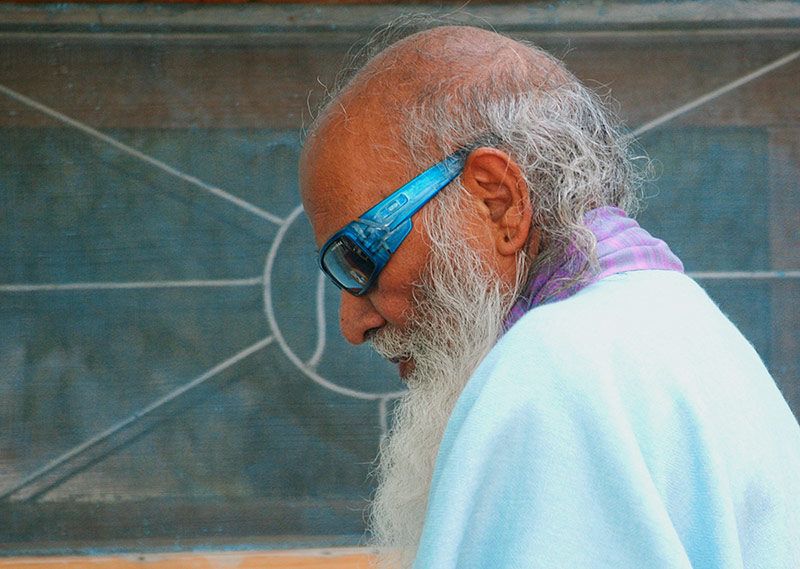
Aham andhera (darkness of the individual I)—the I—always knows that it has become so small that it only belongs to the body. So the I only knows the body. Though in each person there is the I, but we do not recognize this, that that I is this I, and this I is that I, and all that. This is due to andhera, due to darkness—due to illusion, ignorance, mind, intellect, ego—which is the inner instrumentality of knowing that knows this way which is very individual, very single. It is so permeated in the body that there is the belief, “The body will die, so I will die.” Therefore, all these years we have tried to separate it. We still continue that your I has never, never become your body. Your sesame seed has never gone to the oil. [Laughter] I is never in your body. But that is andhera, that is darkness. You do not leave the stand that, “I is in my body, or in my head, or in my intellect, or ego”—that is ahankar.
If we are made like that, we have no grudge against anybody. We just thank the Almighty, whoever or whatever that is, that we are made like that. Yet we are fully awakened to find out that if it is that the I is not working, so I should have that knowledge with which I should say, “I am the Whole.” Then the Whole is where? I am not in the Whole. The Whole is in Me. To that extent you continue. And I pray to you, salute you, say bon voyage, and offer all my love to you.
